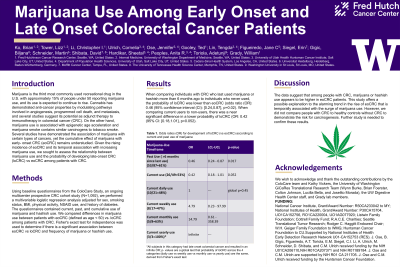Tuesday Poster Session
Category: Colorectal Cancer Prevention
P3204 - Marijuana Use Among Colorectal Cancer Patients Using the ColoCare Study
Tuesday, October 24, 2023
10:30 AM - 4:00 PM PT
Location: Exhibit Hall

Has Audio

Brian Ko, MD
University of Washington
Seattle, WA
Presenting Author(s)
Brian Ko, MD1, Lizz Tower, MD1, Christopher Li, MD, PhD2, Cornelia M. Ulrich, PhD, MS3, Jennifer Ose, PhD, MSc3, Ted Gooley, PhD2, Tengda Lin, MPH, MA3, Jane Figueiredo, PhD4, Erin Siegel, PhD, MPH5, Biljana Gigic, PhD6, Martin Schneider, MD6, David Shibata, MD7, Sheetal Hardikar, MBBS, PhD, MPH3, Anita R. Peoples, PhD, MPH3, Adetunji Toriola, MD, PhD8, William M. Grady, MD2
1University of Washington, Seattle, WA; 2Fred Hutchinson Cancer Center, Seattle, WA; 3Huntsman Cancer Institute, Salt Lake City, UT; 4Cedars-Sinai Medical Center, Los Angeles, CA; 5Moffitt Cancer Center, Tampa, FL; 6Heidelberg University Hospital, Heidelberg, Baden-Wurttemberg, Germany; 7University of Tennessee Health Science Center, Memphis, TN; 8Washington University School of Medicine in St. Louis, St. Louis, MO
Introduction:
Marijuana is the third most commonly used recreational drug in the U.S. with approximately 15% of people under 50 reporting marijuana use, and its use is expected to continue to rise. Cannabis has demonstrated anti-cancer properties by modulating pathways involved in angiogenesis, programmed cell death, and metastasis, and several studies suggest its potential as adjunct therapy to immunotherapy in colorectal cancer (CRC). On the other hand, marijuana use is associated with epigenetic age acceleration and marijuana smoke contains similar carcinogens to tobacco smoke. Several studies have demonstrated the association of marijuana with certain types of cancers, yet the cumulative effect of marijuana with early-onset CRC (eoCRC) remains understudied. Given the rising incidence of eoCRC and its temporal association with increasing marijuana use, we sought to assess the relationship between marijuana use and the probability of developing late-onset CRC (loCRC) vs eoCRC among patients with CRC.
Methods:
Using baseline questionnaires from the ColoCare Study, an ongoing multicenter prospective CRC cohort study (N=1,092), we performed a multivariable logistic regression analysis adjusted for sex, smoking status, BMI, physical activity, NSAID use, and history of diabetes. The questionnaires contained current, past, and cumulative use of marijuana and hashish use. We compared differences in marijuana use between patients with eoCRC (defined as age < 50) vs. loCRC among patients with CRC. Fisher's exact test for independence was used to determine if there is a significant association between eoCRC vs loCRC and frequency of marijuana or hashish use.
Results:
When comparing individuals with CRC who last used marijuana or hashish more than 6 months ago to individuals who never used, the probability of loCRC was lower than eoCRC (odds ratio (OR): 0.46 (95% confidence interval (CI): [0.24,0.87], p=0.02). When comparing current users to non-users, there was a near significant difference in a lower probability of loCRC (OR: 0.42 (95% CI: [0.18,1.01], p=0.052).
Discussion: The data suggest that among people with CRC, marijuana or hashish use appears to be higher in eoCRC patients. This study offers a possible explanation to the alarming trend in the rise of eoCRC that is temporally associated with the surge of marijuana use. However, we did not compare people with CRC to healthy controls without CRC to demonstrate the risk for carcinogenesis. Further study is needed to confirm these results.
Disclosures:
Brian Ko, MD1, Lizz Tower, MD1, Christopher Li, MD, PhD2, Cornelia M. Ulrich, PhD, MS3, Jennifer Ose, PhD, MSc3, Ted Gooley, PhD2, Tengda Lin, MPH, MA3, Jane Figueiredo, PhD4, Erin Siegel, PhD, MPH5, Biljana Gigic, PhD6, Martin Schneider, MD6, David Shibata, MD7, Sheetal Hardikar, MBBS, PhD, MPH3, Anita R. Peoples, PhD, MPH3, Adetunji Toriola, MD, PhD8, William M. Grady, MD2. P3204 - Marijuana Use Among Colorectal Cancer Patients Using the ColoCare Study, ACG 2023 Annual Scientific Meeting Abstracts. Vancouver, BC, Canada: American College of Gastroenterology.
1University of Washington, Seattle, WA; 2Fred Hutchinson Cancer Center, Seattle, WA; 3Huntsman Cancer Institute, Salt Lake City, UT; 4Cedars-Sinai Medical Center, Los Angeles, CA; 5Moffitt Cancer Center, Tampa, FL; 6Heidelberg University Hospital, Heidelberg, Baden-Wurttemberg, Germany; 7University of Tennessee Health Science Center, Memphis, TN; 8Washington University School of Medicine in St. Louis, St. Louis, MO
Introduction:
Marijuana is the third most commonly used recreational drug in the U.S. with approximately 15% of people under 50 reporting marijuana use, and its use is expected to continue to rise. Cannabis has demonstrated anti-cancer properties by modulating pathways involved in angiogenesis, programmed cell death, and metastasis, and several studies suggest its potential as adjunct therapy to immunotherapy in colorectal cancer (CRC). On the other hand, marijuana use is associated with epigenetic age acceleration and marijuana smoke contains similar carcinogens to tobacco smoke. Several studies have demonstrated the association of marijuana with certain types of cancers, yet the cumulative effect of marijuana with early-onset CRC (eoCRC) remains understudied. Given the rising incidence of eoCRC and its temporal association with increasing marijuana use, we sought to assess the relationship between marijuana use and the probability of developing late-onset CRC (loCRC) vs eoCRC among patients with CRC.
Methods:
Using baseline questionnaires from the ColoCare Study, an ongoing multicenter prospective CRC cohort study (N=1,092), we performed a multivariable logistic regression analysis adjusted for sex, smoking status, BMI, physical activity, NSAID use, and history of diabetes. The questionnaires contained current, past, and cumulative use of marijuana and hashish use. We compared differences in marijuana use between patients with eoCRC (defined as age < 50) vs. loCRC among patients with CRC. Fisher's exact test for independence was used to determine if there is a significant association between eoCRC vs loCRC and frequency of marijuana or hashish use.
Results:
When comparing individuals with CRC who last used marijuana or hashish more than 6 months ago to individuals who never used, the probability of loCRC was lower than eoCRC (odds ratio (OR): 0.46 (95% confidence interval (CI): [0.24,0.87], p=0.02). When comparing current users to non-users, there was a near significant difference in a lower probability of loCRC (OR: 0.42 (95% CI: [0.18,1.01], p=0.052).
Discussion: The data suggest that among people with CRC, marijuana or hashish use appears to be higher in eoCRC patients. This study offers a possible explanation to the alarming trend in the rise of eoCRC that is temporally associated with the surge of marijuana use. However, we did not compare people with CRC to healthy controls without CRC to demonstrate the risk for carcinogenesis. Further study is needed to confirm these results.
Disclosures:
Brian Ko indicated no relevant financial relationships.
Lizz Tower indicated no relevant financial relationships.
Christopher Li indicated no relevant financial relationships.
Cornelia Ulrich indicated no relevant financial relationships.
Jennifer Ose indicated no relevant financial relationships.
Ted Gooley indicated no relevant financial relationships.
Tengda Lin indicated no relevant financial relationships.
Jane Figueiredo indicated no relevant financial relationships.
Erin Siegel indicated no relevant financial relationships.
Biljana Gigic indicated no relevant financial relationships.
Martin Schneider indicated no relevant financial relationships.
David Shibata indicated no relevant financial relationships.
Sheetal Hardikar indicated no relevant financial relationships.
Anita Peoples indicated no relevant financial relationships.
Adetunji Toriola indicated no relevant financial relationships.
William Grady: DiaCarta – Consultant. Freenome – Advisory Committee/Board Member. GLG – Consultant. Guardant Health – Advisory Committee/Board Member. Guidepoint – Consultant. Helio – Consultant. Janssen Pharmaceuticals – Clinical investigator. LucidDx – Grant/Research Support. Natera – Consultant. SEngine – Advisory Committee/Board Member. Tempus – Grant/Research Support.
Brian Ko, MD1, Lizz Tower, MD1, Christopher Li, MD, PhD2, Cornelia M. Ulrich, PhD, MS3, Jennifer Ose, PhD, MSc3, Ted Gooley, PhD2, Tengda Lin, MPH, MA3, Jane Figueiredo, PhD4, Erin Siegel, PhD, MPH5, Biljana Gigic, PhD6, Martin Schneider, MD6, David Shibata, MD7, Sheetal Hardikar, MBBS, PhD, MPH3, Anita R. Peoples, PhD, MPH3, Adetunji Toriola, MD, PhD8, William M. Grady, MD2. P3204 - Marijuana Use Among Colorectal Cancer Patients Using the ColoCare Study, ACG 2023 Annual Scientific Meeting Abstracts. Vancouver, BC, Canada: American College of Gastroenterology.

